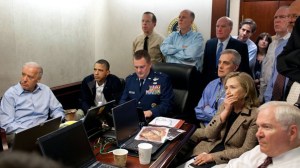Americans’ memories of the killing of Osama bin Laden will forever be tied to a few iconic images.
CNN’s Peter Bergen was given unprecedented access to the White House to talk about this monumental mission and the war on terror with President Barack Obama on the fifth anniversary of bin Laden’s death. We shot the interview in four locations in the White House, each with significance to the bin Laden mission.
The Situation Room’s John F. Kennedy Conference Room

For the first time ever, the President sat down for an interview in the highly secure Situation Room, which is called the John F. Kennedy Conference Room and is the one famously reproduced in movies and TV shows. It is here that the commander in chief is briefed on classified operations and the country’s most sensitive national security issues.
A huge conference table with screens on the walls around the room. The President’s black leather chair, at the head of a massive wooden table, has a higher back than the other chairs around the table where his key advisors sit. Behind him, a presidential seal is affixed.
It was in this room, on Thursday, April 28, that Obama sat to hear for the final time from the top members of his Cabinet and staff whether the U.S. should go ahead with the risky operation. It was not unanimous. Vice President Joe Biden and Defense Secretary Robert Gates urged caution; then-Secretary of State Hillary Clinton, Joint Chiefs Chairman Adm. Mike Mullen and counterterrorism advisor (and now CIA Director) John Brennan were among those who said the raid should go ahead.
The President left the meeting that night saying he would let them know in the morning. Of course, we now know he decided to give them the go-ahead.
Three days later, on the afternoon of May 1, the team assembled in the same room as the mission began to unfold. On the screen was then-CIA Director Leon Panetta providing updates from his office at headquarters in Langley. Panetta was watching live video streams and getting updated himself from Afghanistan by Adm. William McRaven, who was running the Special Operations mission.
The Small Conference Room
No room is more iconic when it comes to the bin Laden raid than the small conference room in the Situation Room complex, just across the hall from where the President and his team had gathered at the start of the mission. Bergen talked there with the President about what he was thinking as the raid commenced.
It is the room most associated with the bin Laden mission because of the famous photo of the President and his staff watching as events unfold, intense looks on everyone’s faces and a hand over Clinton’s mouth.
The President was not supposed to be in this room but decided to relocate there because he felt he needed to see the live feed from a drone over Abbottabad that was showing grainy footage of the raid in progress, not just listen to information being relayed by Panetta.
The room is tiny, filled almost entirely with a massive table and just enough room for the chairs around it. The table is up against a wall mostly covered by a video screen, which is what everyone in the photo of the operation was staring at.
Fourteen people crammed into the room, the President sitting in a folding chair on the corner of the table’s head. They sat in this room until the SEALs returned to Afghanistan.
The Colonnade
After the raid ended, the President went to work on his statement to the nation in the Oval Office. When the statement was ready, he walked down the Colonnade — the outdoor walkway between the West Wing where his office is located and the East Wing, which is where the residence is.
The Colonnade has a row of columns and runs alongside the Rose Garden. Still visible is the playground set erected by the President for his young daughters when they the first moved in.
As he strode the approximately 100 feet from the Oval Office to give his speech, the President heard crowds assembling along the north side of the complex, excitedly chanting “USA.”
The Cross Hall and East Room
Our final stop with Obama was the Cross Hall, where he approached the waiting camera to announce the successful raid. The hall, with its high ceilings and bright red carpet, leads to the doorway of the East Room, in which the lectern was set up for him to announce to the world:
“Good evening. Tonight, I can report to the American people and to the world that the United States has conducted an operation that killed Osama bin Laden, the leader of al Qaeda, and a terrorist who’s responsible for the murder of thousands of innocent men, women, and children.”















